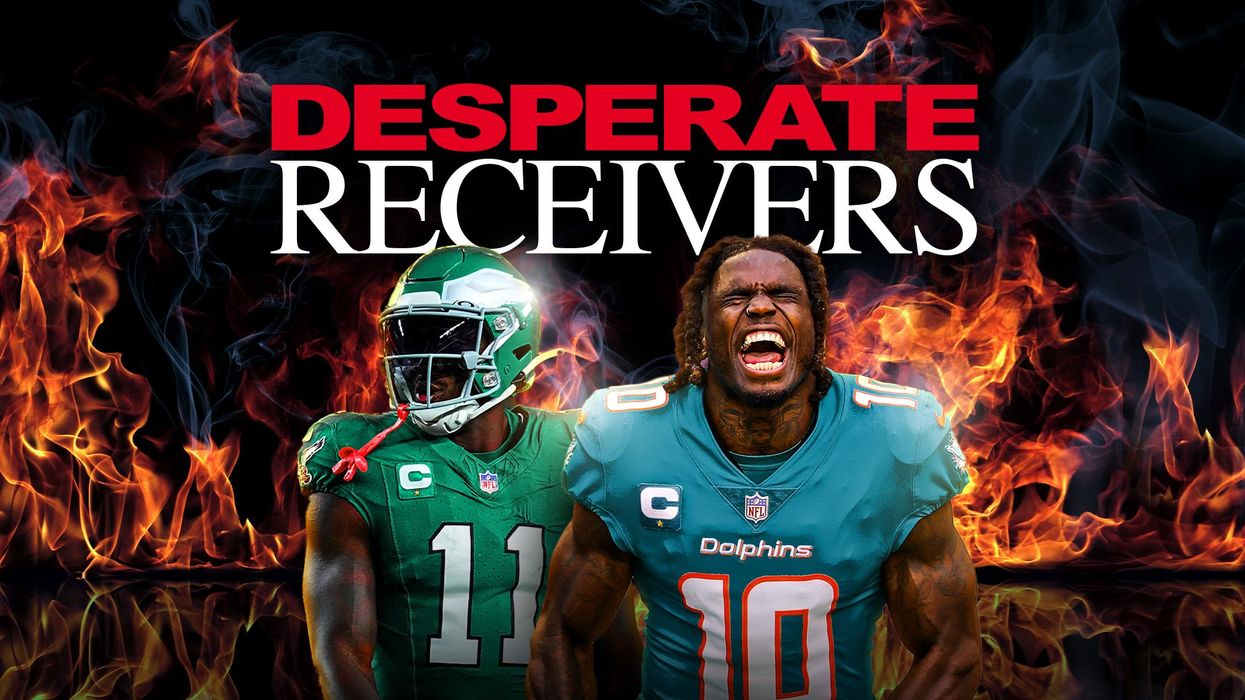
Mitchell Leff / Contributor, Megan Briggs / Contributor | Getty Images

A league built around wide receivers will be quite different from the one that used to rely on quarterbacks and running backs.
The two most important players in the National Football League do not play quarterback. They both play wide receiver: Miami’s Tyreek Hill and Philadelphia’s A.J. Brown.
Most NFL experts have yet to reach this obvious conclusion. They’ve so far failed to recognize the consequence of rule changes initiated to make the game “safer” and promote scoring.
Football is no longer a heavyweight combat sport. It’s a battle of lightweights, a competition controlled and decided more often than not on the referees’ scorecards rather than knockout punches. An imposition of will has been transformed into a game of finesse so that it is more palatable to women, emasculated men, and non-sports fans.
Wide receivers dominate today’s game, and their importance to the game will only grow more stronger as the league continues to reduce the degree of difficulty and risks for all players.
With eight games to play, Hill and Brown both have a chance to eclipse 2,000 receiving yards for a season. The NFL record is 1,964 yards, a number Calvin Johnson reached during the 16-game 2012 season. The NFL now plays 17 games.
According to gambling oddsmakers, nothing has really changed in the National Football League. Five quarterbacks — Patrick Mahomes, Jalen Hurts, Lamar Jackson, Tua Tagovailoa, and Joe Burrow — are the favorites to win league MVP.
In the new, kinder, gentler NFL, wide receivers are just as important as quarterbacks.
The odds reflect the mindset of Associated Press voters. They’ve been programmed to follow the prescribed NFL narrative: The quarterback of the most successful team is always a front-runner for MVP. Quarterback is the most difficult and important position in all of sports.
This is no longer true. No position in sports has had its degree of difficulty reduced as drastically as quarterback. Quarterbacks no longer call their own plays. They run simplified, college-style offenses. There are restrictive rules and regulations limiting when, where, and how you can hit them. The consequences for throwing a receiver into coverage have been virtually eliminated.
Patrick Mahomes doesn’t face the kind of challenges Johnny Unitas, Bart Starr, Roger Staubach, Terry Bradshaw, and Dan Fouts confronted throughout their careers. Mahomes isn’t playing the same game that Tom Brady and Peyton Manning played when they first entered the NFL.
Football has changed. The way we evaluate value and importance needs to change, too.
In the nearly 70 years the Associated Press has been naming an NFL MVP, no wide receiver has ever won the award. In 1987, Jerry Rice probably should have won MVP. He scored 22 touchdowns in a strike-shortened season. He played just 12 regular-season games. John Elway won the MVP award in a very close race.
Quarterbacks and running backs have dominated the MVP. Defensive tackle Alan Page, kicker Mark Moseley, and linebacker Lawrence Taylor are the only three players to win the award who did not play running back or quarterback.
This year we should strongly consider adding a new position to the MVP club. In the new, kinder, gentler NFL, wide receivers are just as important as quarterbacks.
Tyreek Hill and A.J. Brown are allowing two solid former Alabama quarterbacks — Hurts and Tagovailoa — to masquerade as MVP candidates. Strip Hill and Brown from Miami and Philadelphia, respectively, and Jalen and Tua are nowhere near the top of the MVP race.
I’m not denigrating Hurts and Tagovailoa. They’re solid players. I’m recognizing the greatness of Hill and Brown and the transformation of football. The wide receiver position has never been more important than it is today.
Rule changes have elevated the importance of the players who line up outside the hashes. Football — when it was a game defined by physicality — used to prioritize the players who lined up in the middle of the field. You would build an offense around the center, quarterback, and running back. You would build a defense around a defensive tackle, middle linebacker, and safety.
Now the most valuable players are on the outside. Receivers, edge rushers, and corners are ascending in value. The MVP vote should reflect this new reality.
It will be interesting to see if the NFL allows its media partners to discuss the new reality. The league’s television ratings are tied to selling the myth of the all-important, all-American quarterback.
Will diva wide receivers attract as wide an audience as Mahomes versus Burrow?
What’s going to happen when Minnesota’s Justin Jefferson realizes he’s more valuable than Kirk Cousins? What will that contract negotiation look like?
Teams, management, and head coaches have been partnering with quarterbacks for decades. The New England dynasty hinged on the relationship among Robert Kraft, Bill Belichick, and Tom Brady.
In the late 1990s and early 2000s, Vikings head coach Dennis Green partnered with Cris Carter and Randy Moss. As Carter's and Moss’ influence grew within the Minnesota locker room, the culture soured. The Vikings fired Green in 2001.
A league built around wide receivers will be quite different from the one that used to rely on quarterbacks and running backs. My prediction is that it’s going to be a lot safer, far less predictable, and a lot more appealing to the crowd that loves “Desperate Housewives” and “The Bachelor.”
Jason Whitlock
BlazeTV Host